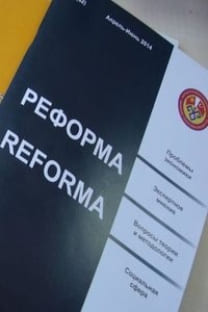CORPORATIVE ETHIC AS A TOOL OF OPTIMIZATION OF THE MANAGEMENT PROCESS IN THE ORGANIZATION
measurable result, corporative ethic, corporative culture, strategy planning, feed-back, monitoring, conflict prevention
CORPORATIVE ETHIC AS A TOOL OF OPTIMIZATION OF THE MANAGEMENT PROCESS IN THE ORGANIZATION
measurable result, corporative ethic, corporative culture, strategy planning, feed-back, monitoring, conflict prevention,
___
- Корчагин, Ю. А. Человеческий капитал как интенсивный социально-экономический фактор развития личности, экономики, общества и государственности. – Москва: ВШЭ, 2011.
- Касымбеков, Т. Т. Управление медицинскими кадрами в период коммерциализации рынка медицинских услуг // Реформа. – 2013. – №1. – С.74.
- Таусенд, Р. Сломай систему. – Москва: Альпина бизнес бук, 2008.
- Даровских, В.Д. Условия достижения стратегической конкурентоспособности бизнеса (на примере туристической отрасли) // Реформа. – 2012. – №3. – С.61.
- ISSN: 1694-5158
- Yayın Aralığı: Yılda 2 Sayı
- Başlangıç: 1999
- Yayıncı: Kırgızistan Türkiye Manas Üniversitesi
GELENEKSEL BANKACILIK SİSTEMİNE ALTERNATİF OLARAK FAİZSİZ BANKACILIK SİSTEMİ
ADDRESSING CHALLENGES IN THE DEVELOPMENT OF THE BANKING SYSTEM OF KYRGYZ REPUBLIC FOR THE FUTURE
KIRGIZISTAN ALTIN SEKTÖRÜNÜN REKABET GÜCÜ
STRENGTHENING ROLE OF THE STATE IN INVESTMENT PROMOTION IN THE ECONOMY OF THE KYRGYZ REPUBLIC
KYRGYZSTAN – 15 YEARS IN THE WTO
THE IMPACT OF GLOBAL CLIMATE CHANGE ON ENVIRONMENT (IN CAUSE OF WATER USE IN CENTRAL ASIA)
HUMAN RESOURCES TRAINING NEEDS IN THE PRIVATE SECTOR OF KYRGYZSTAN
S. ÇAVUŞ, A. YAMALTDİNOVA, S. NAJİMUDİNOVA, A. MAKSUDUNOV, M. ABDILDAYEV
CORPORATIVE ETHIC AS A TOOL OF OPTIMIZATION OF THE MANAGEMENT PROCESS IN THE ORGANIZATION
FORMATION OF PROFITS OF AGRICULTURAL PRODUCERS AS A BASIS OF RISK WARNINGS AND REDUCTION
K. A. ABDYMALİKOV, T. A. TAİPOV
DEVELOPMENT OF THE INNOVATIVE PROCESS IN PRODUCTION AND PROCESSING OF THE MILK
